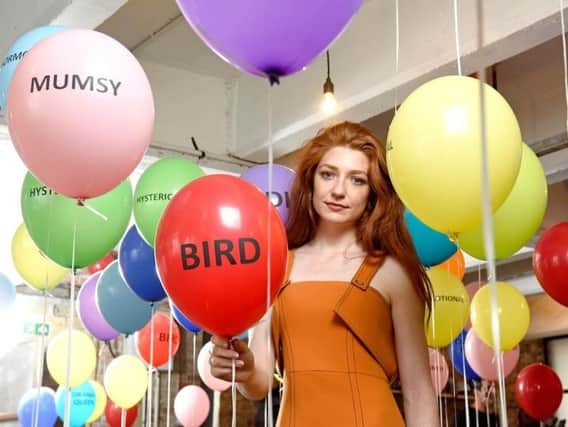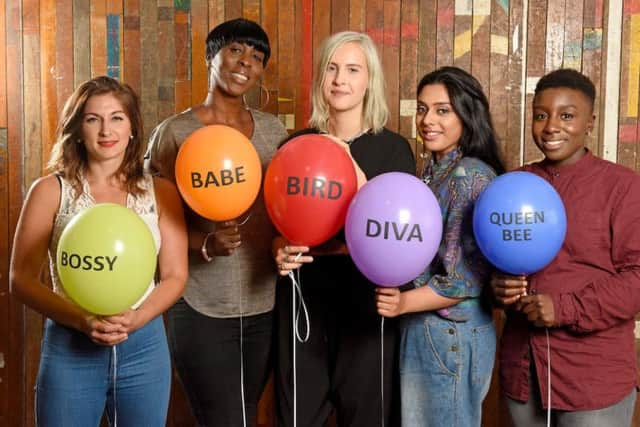HAVE YOUR SAY: Do you think these words should be banned?


British women want to banish ‘bird’ from the social dictionary with nearly 60 percent branding it their most hated pet name.
Taking to task phrases they deem derogatory, a survey of more than 2,000 British women placed ‘mumsy’, ‘hormonal’ and ‘ball breaker’ among the top 10 words they would like to see banned from day to day vocabulary.
Advertisement
Hide AdAdvertisement
Hide AdThe findings, released as part of a new campaign from Special K inspiring inner strength in women, revealed women are tired of being labelled ‘hysterical’ and ‘high maintenance’, and according to open responses, also aimed to silence words such as ‘Feminazi’ and ‘baron’ from daily lingo.


Where it was once believed to be an endearing term for your male co-worker to call you ‘honey’ or ‘gorgeous’, 40 per cent of women said they felt ‘patronised’ when subjected to a pet name especially in the workplace.
But it isn’t just men handing out the sexist slurs in the office, more than a quarter of women described the use of pet names such as ‘babe’ or ‘doll’ by their female peers as ‘patronising’ or ‘belittling’ (13 per cent).
According to the Special K research, on average women claimed to hear men use these undermining terms seven times a month- interestingly the same amount as other women.
Advertisement
Hide AdBritish women claimed they felt their strength as a female is undermined four times a day.


Advertisement
Hide AdInfuriated by the gender balance, a whopping third of young women (16-24 years old) confessed they had been told to ‘man up’ in the workplace.
Keen to strike a balance, 72 per cent of women said they would like to see more often women described as ‘confident’, or ‘resilient’ (46 per cent) and ‘courageous’ (35 per cent).
The findings, released as part of a new campaign from Special K inspiring inner strength in women, lifted the lid on the lack of ‘strong female’ representation in society, with 51 per cent of Brits believing a strong women is viewed negatively in today’s world.
Advertisement
Hide AdWorryingly the study showed one in ten believed strong female role models were most lacking in our schools – with high powered city (26 per cent) jobs and trades (22 per cent) failing to provide female role models.
Nearly a third of British women surveyed said they had been described as a ‘flirt’ or a ‘show off’ for being confident growing up– with 30 per cent admitting this has affected their self-esteem later on in life.
Advertisement
Hide AdThe research is part of Special K’s new ‘Strength Is…’ campaign, which is being fronted by ambassadors Katie Piper, Nicola Roberts and Lisa Faulkner. Together, they form the Special K ‘Strength Squad’ - a collective of strong female voices who aim to inspire others to redefine strength.
Bursting society’s bubble, campaign ambassador Nicola Roberts, said: “It is a strange thing that in a modern society we still have room for language that holds strong women back.
Advertisement
Hide Ad“It is very important young women in society grow up learning that you are not a ‘ball breaker’ if you are successful – you are simply a strong woman succeeding.
“Or don’t allow themselves to be referred to as anything other than who they are in a professional setting.”
The former Girls Aloud star added: “Female strength is something to be celebrated and encouraged, not diminished by unfair labels to undermine their passion and drive.
Advertisement
Hide Ad“Women are too often called ‘bossy’, ‘feisty’ or ‘attention seeking’, now is the time to change the conversation and rewrite the vocabulary we use to empower women and not let others define us.”
TOP FIVE PET NAMES WOMEN WANT BANNED
1. Bird - 56 percent
2. Doll - 45 percent
3. Chick - 42 percent
4. Babe - 38 percent
5. Queen Bee - 33 percent
TOP 20 WORDS WOMEN WOULD BAN
1. Hormonal - 68 percent
2. Drama Queen - 56 percent
3. Bitchy - 53 percent
4. High Maintenance - 51 percent
5. Hysterical - 50 percent
6. Ball Breaker - 49 percent
7. Diva - 48 percent
8. Highly Strung - 46 percent
9. Mumsy - 42 percent
10. Princess - 40 percent
11. Attention Seeking - 35 percent
12. Emotional - 31 percent
13. Manipulative - 28 percent
14. Bossy - 27 percent
15. Controlling - 25 percent
16. Difficult - 21 percent
17. Sexy - 20 percent
18. Aggressive - 19 percent
19. Sassy - 16 percent
20. Feisty – 14 percent